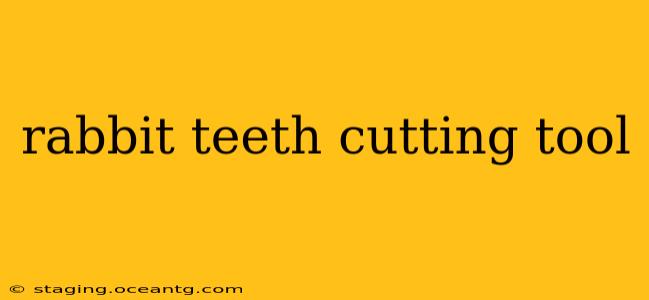Rabbit teeth, with their continuously growing incisors, require specialized tools for safe and effective trimming. This guide explores various rabbit teeth cutting tools, their uses, and crucial safety considerations. Understanding these tools is vital for responsible rabbit ownership and maintaining your pet's oral health.
What are the Different Types of Rabbit Teeth Cutting Tools?
Several tools are specifically designed for trimming rabbit teeth, each with its own advantages and disadvantages. The most common include:
-
Nail Clippers (for very minor trimming): Small, sharp nail clippers designed for rabbits can be used to carefully trim the very tips of slightly overgrown incisors. However, this is only suitable for minimal trimming and should only be attempted if you have experience and the rabbit is calm and cooperative. Improper use can cause serious injury.
-
Rabbit Tooth Files: These files are designed to gently grind down the incisors. They are generally considered safer than clippers for inexperienced handlers, as they are less likely to cause accidental cuts if used correctly. However, they require a steady hand and patience.
-
Dremel-type Rotary Tools (with specialized bits): While some use Dremel tools with specialized grinding bits for rabbit teeth, this is generally not recommended for inexperienced owners. The high speed and potential for serious injury make this a risky option unless you have extensive experience and training in veterinary dentistry. Improper use can easily lead to severe pain and damage to the teeth or gums.
How Do I Choose the Right Rabbit Teeth Cutting Tool?
Selecting the appropriate tool depends heavily on your experience level and the rabbit's temperament.
-
Beginners: A rabbit tooth file is generally the safest option for beginners. It allows for more controlled and gradual trimming, minimizing the risk of injury.
-
Experienced Handlers: Experienced handlers might feel comfortable using nail clippers for minor adjustments, but even then, caution is paramount. Dremel tools should only be used by professionals or individuals with extensive training in veterinary dental procedures.
What are the Safety Precautions When Using Rabbit Teeth Cutting Tools?
Safety is paramount when handling any sharp tool near a rabbit. Always follow these guidelines:
-
Restrain Properly: Securely and comfortably restrain the rabbit to prevent accidental movement. A gentle but firm hold is crucial. Never force the rabbit.
-
Work Slowly and Carefully: Take your time and avoid rushing. Sudden movements can startle the rabbit and lead to injury.
-
Check for Bleeding: Monitor closely for any bleeding. If bleeding occurs, apply gentle pressure with a clean cloth. If bleeding is excessive, seek immediate veterinary attention.
-
Observe for Signs of Distress: Pay close attention to the rabbit's reactions. If it seems distressed or agitated, stop immediately and try again later.
-
Regular Veterinary Check-Ups: Even with careful home trimming, regular veterinary check-ups are essential to ensure the rabbit's teeth are healthy and properly aligned.
How Often Should I Trim My Rabbit's Teeth?
The frequency of teeth trimming varies depending on the rabbit's age, breed, diet, and overall health. Some rabbits require more frequent trimming than others. Regular veterinary check-ups are crucial to determine the appropriate trimming schedule. Never attempt to trim your rabbit's teeth without professional guidance, especially if you are unsure of their condition.
What Happens If I Don't Trim My Rabbit's Teeth?
Untrimmed rabbit teeth can lead to several serious health problems, including:
- Malocclusion: Misalignment of the teeth, making it difficult to chew properly.
- Abscesses: Infections caused by overgrown or damaged teeth.
- Weight Loss: Difficulty eating due to painful or misaligned teeth.
- Dental Disease: Severe dental problems can lead to significant pain and discomfort.
Can I Trim My Rabbit's Teeth Myself?
While some minor trimming might be manageable with proper training and tools, it is highly recommended to seek professional veterinary care for routine dental check-ups and teeth trimming. Veterinarians have the expertise and tools to accurately assess the rabbit's dental health and perform safe and effective procedures.
Disclaimer: This information is for educational purposes only and should not be considered a substitute for professional veterinary advice. Always consult with a veterinarian regarding the health of your pet.
